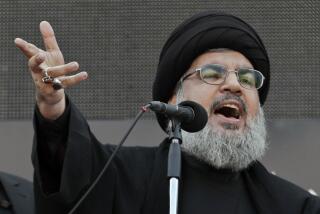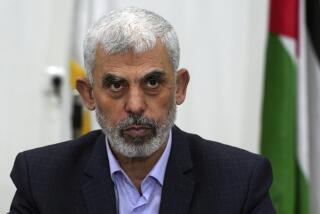Palestinian Peacemaker No Longer Speaks of It
- Share via
GAZA CITY — Mohammed Dahlan seems unusually relaxed for someone who tops Israel’s list of bad guys.
Arguably the Palestinians’ most powerful security official, Dahlan has been accused by Israelis of masterminding terrorism. His offices have been bombarded by combat helicopters. One right-wing opposition leader is even said to have suggested assassinating him.
Not so long ago, Dahlan was a favorite of the White House and a willing negotiator with the Israelis. His crackdown on Islamic radicals had won him accolades in the West. But today, he has dropped any and all language of peace and reconciliation.
The metamorphosis in Dahlan, and in the way he is perceived by Israel, reflects the upending of the entire Middle East peace process, devastated by more than two months of bloody revolt. Those once considered the moderates are now hard-liners; those once considered partners are terrorists.
For Dahlan, more is at play. As he takes an increasingly belligerent stance, his stature among Palestinians improves--an important tactic ahead of what may become a chaotic power struggle as the influence of Yasser Arafat’s Palestinian Authority declines.
In an interview Sunday at his elegant office in the headquarters of the Preventive Security Service, which he commands, Dahlan said he will no longer lift a finger to protect Israelis from terrorism.
“I have a right to resist Israel as an occupier,” Dahlan said. “It is not my job anymore to protect Israel. Do they think we are units of the Israeli army?”
Many Israelis argue that this is the true face of Dahlan, that his commitment to the peace process was a matter of political expediency.
Offices of the security service were prime targets when Israel launched rocket strikes Nov. 20 in retaliation for a bomb blast that tore apart a school bus traveling between Jewish settlements in the Gaza Strip, killing two Jewish adults and severely wounding five children.
A senior Israeli military intelligence officer, briefing foreign reporters a few days later, implicated members of Dahlan’s police force in the bus bombing. On Sunday, as Dahlan dismissed suggestions that he should be responsible for seizing the perpetrators, the Israeli military announced it had arrested a Palestinian suspect in the case.
Two days before the bus attack, another member of Dahlan’s force infiltrated the outskirts of the Kfar Darom Jewish settlement in the Gaza Strip and killed two Israeli soldiers before being shot dead. Later, at the man’s funeral, Dahlan hailed him as a courageous martyr and promoted him posthumously. Posters of the man are now displayed all over police stations.
As Gaza was being hit by Israeli gunships that November night--more than a dozen missiles punctured Dahlan’s building--the right-wing Israeli opposition leader Ariel Sharon was reportedly suggesting that Dahlan be assassinated. Israel has in fact targeted Palestinian militia leaders during the conflict, so the idea had a particularly chilling ring to it.
Initially, Dahlan made a point of moving around the city a lot and not revealing his whereabouts. By Sunday, however, he was keeping what seemed like more regular hours. Seated behind his expansive wooden desk decorated with intricate mosaic inlays, he joked with aides, talked for more than an hour with a reporter and seemed in no hurry. His desk was uncluttered, and there were two telephones that rang regularly. There were no computers, only an electric paper shredder.
While he was still on speaking terms with the Israelis, Dahlan was emerging as a key negotiator. At the summer’s Camp David summit, pictures routinely showed him at the elbow of President Clinton or Israeli Prime Minister Ehud Barak. He was described by diplomats as one of the Palestinians who most attempted to persuade Arafat to sign a deal. And he has met from time to time with CIA Director George J. Tenet, whose agency assisted Palestinian security.
Working closely with Israeli security services in 1998 and 1999, Dahlan cracked down, if sometimes reluctantly, on Hamas, Islamic Jihad and other militant groups who oppose peace with Israel and have carried out deadly terrorist bombings in major Israeli cities.
Dahlan noted Sunday that his efforts had helped give Israelis unprecedented security, which, he warned, they will not be able to replicate. Several of the bomb-makers and terrorism plotters whom Dahlan jailed were released in the early days of this conflict.
If his cooperation with Israel gained him points in Washington, at home Dahlan was increasingly seen as a sellout. His security service--one of more than a dozen police forces that exist in the West Bank and Gaza--is reviled by many Palestinians and accused of egregious human rights violations.
The same Islamic militants whom the U.S. and Israel were so happy to see arrested usually ended up deprived of due process, held without being charged or sentenced, and often tortured or beaten, human rights organizations say.
Dahlan was also named in several corruption scandals plaguing the Palestinian Authority. In exchange for providing security, his police force receives a huge cut in proceeds from the principal border crossing into Gaza, and he controls security at Gaza’s only airport. With an affinity for Mercedes-Benzes and fine clothes, the 39-year-old Dahlan invested in a multimillion-dollar Gaza beach resort and was at one point building a house so ostentatiously lavish that Arafat is said to have ordered him to stop.
When the allegations of corruption were brought up to him during Sunday’s interview, he merely smiled broadly and laughed.
Dahlan did acknowledge that his work with the Israelis cost him dearly in Palestinian public opinion--worth it, he said, if Palestinians achieve statehood and other political goals, but not if nothing is gained.
“I worked for seven years on the peace process, and the result was zero,” he said.
Dahlan’s biography has elements that parallel stages in the lives of many of the newer generation of Palestinian leaders: He grew up in Gaza’s Khan Yunis refugee camp, learned Hebrew in an Israeli prison and was deported in 1987, returning to Gaza with Arafat in 1994. He had been a vital link between an exiled Arafat and the first intifada in the late 1980s and early ‘90s.
But more recently, he tied his credibility to the peace process and the power and position that went with it. As the process has crumbled, Dahlan has needed to revive his credentials as a tough veteran of Arafat’s streetwise Fatah movement, whose militia is leading many of the armed battles against Israeli forces in the new intifada. Being a Fatah leader has more legitimacy now among ordinary Palestinians than being a leader in the peace process, analysts say.
“If you have another hat to put on and can change hats easily as Dahlan did, you are safe and in a good position,” said analyst Khalil Shikaki, who heads a Palestinian think tank in the West Bank city of Ramallah. “If negotiations with Israel eventually resume, you can put the other hat back on. You have the best of two worlds.”
Shikaki said that Dahlan and people like him are jockeying for position as the Palestinian Authority regime, a product of the peace process, shows signs of disintegrating--something likely to continue if the violence does. Questions have already been raised about the extent to which Arafat controls all of the gunmen who menace Israeli settlements on a near nightly basis. Any vacuum would probably be filled by Fatah, which has been ascendant because of the current uprising, but the transition would be chaotic, Shikaki said.
Dahlan may see himself as a successor to Arafat, but most analysts believe that the older guard would stake its claim before Dahlan, who, besides, has little or no following in the West Bank.
Dahlan has denied that he ordered terrorist attacks but has justified targeting Israeli soldiers and settlers in the Gaza Strip. The Israeli military intelligence officer said Dahlan has allowed his police force “to morph from a preventive body that once had a role in restraining Hamas” to “an active player in encouraging terrorism and, in some cases, carrying it out.”
The same phenomenon has been seen in the West Bank, the official said, but it is a bigger threat in Gaza because of Dahlan’s role and his proximity to Arafat.
Despite the estrangement between Dahlan and his erstwhile Israeli colleagues, which deepened further when his cousin was killed in the recent fighting, Dahlan has met twice in the last week with two top Israeli officials. He insisted Sunday that nothing came of the meetings.
In the meantime, in the streets of Gaza, new graffiti have appeared: “We are all Mohammed Dahlan.”
More to Read
Sign up for Essential California
The most important California stories and recommendations in your inbox every morning.
You may occasionally receive promotional content from the Los Angeles Times.














